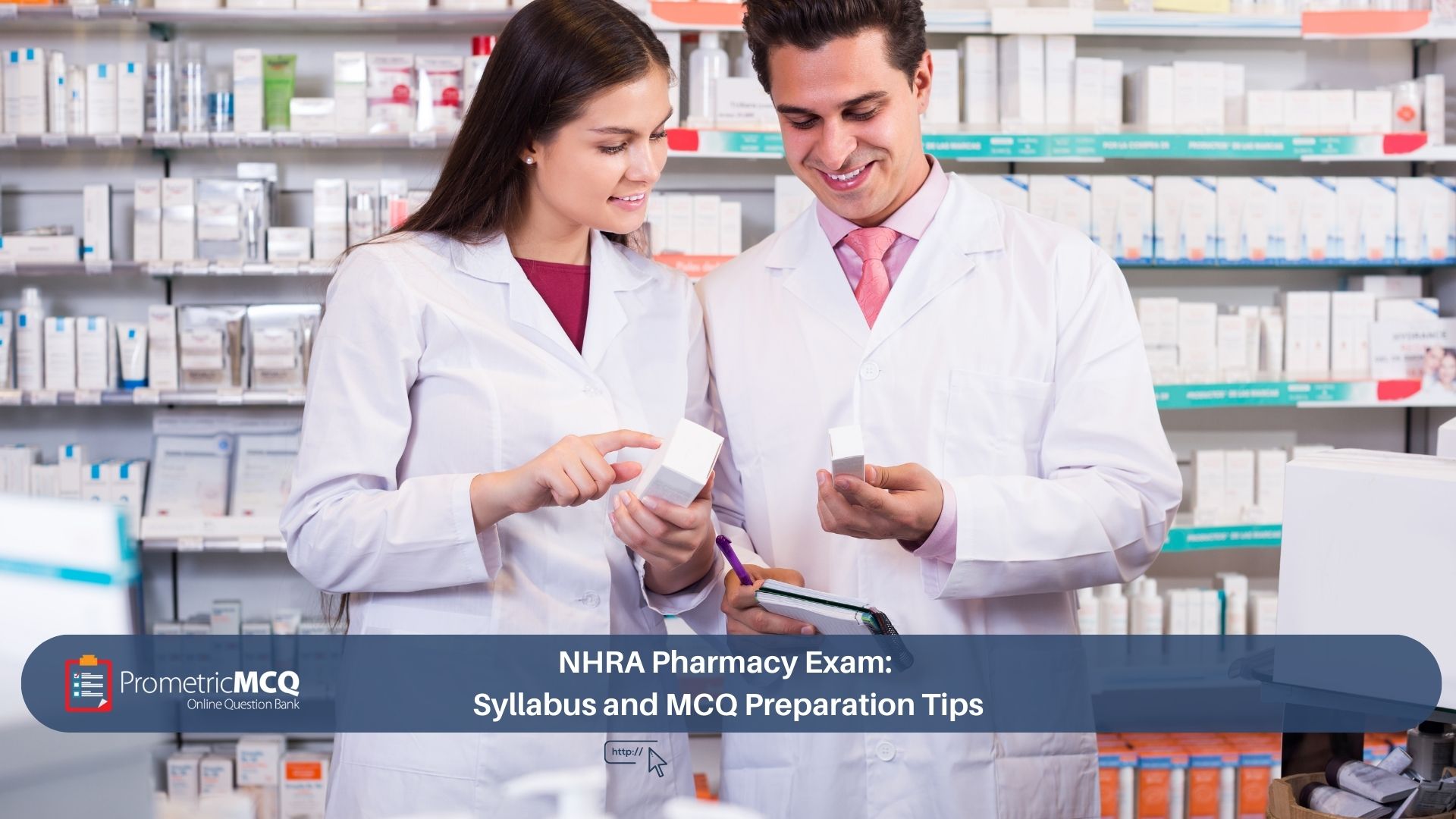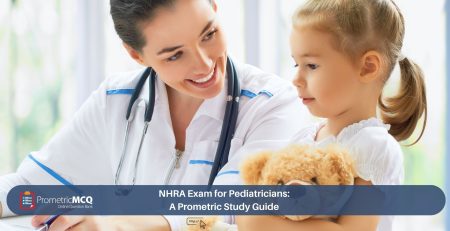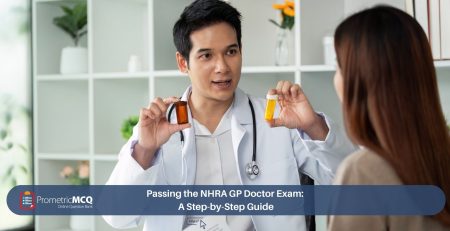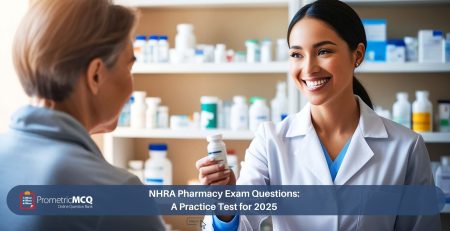
NHRA Pharmacy Exam: Syllabus and MCQ Preparation Tips
fatima@prometricmcq.com2025-09-18T18:36:20+00:00Table of Contents
ToggleNHRA Pharmacy Exam: Syllabus and MCQ Preparation Tips (2025)
The Kingdom of Bahrain, with its sophisticated healthcare system and strategic location in the Gulf, presents a wealth of opportunities for skilled pharmacists. To practice in this dynamic environment, every pharmacist must first obtain a license from the National Health Regulatory Authority (NHRA). The critical step in this process is passing the NHRA Pharmacy Licensure Exam, a comprehensive assessment designed to ensure that practitioners possess the knowledge and competence to provide safe, effective pharmaceutical care.
This exam is far more than a test of academic recall. It is a rigorous evaluation of your clinical judgment, your understanding of pharmaceutical sciences, and your ability to apply this knowledge in a real-world patient care setting. Success requires a strategic approach, focusing on a deep understanding of the exam syllabus and mastering the art of answering Multiple-Choice Questions (MCQs) that simulate clinical challenges.
This ultimate 2025 guide is your definitive roadmap to conquering the NHRA Pharmacy Exam. We will provide a meticulous breakdown of the exam’s syllabus, highlighting the most critical, high-yield topics in each domain. You will find expert MCQ preparation tips, a proven study strategy, and a comprehensive 10-point FAQ section to address all your questions. Our goal is to equip you with the knowledge and confidence to not only pass the exam but to excel.
Key Takeaways for the NHRA Pharmacy Exam
- Clinical Application is King: The exam is heavily focused on clinical scenarios. You must be able to apply your knowledge of pharmacology and therapeutics to patient cases.
- Calculations Must Be Flawless: Pharmaceutical calculation questions are a given. Accuracy is not optional. Practice dilutions, dosages, and infusion rates until they are second nature.
- Know Your Law and Ethics: A significant portion of the exam will test your knowledge of pharmacy ethics and the specific laws and regulations governing pharmacy practice in Bahrain.
- Pharmacology is the Foundation: A deep understanding of drug mechanisms of action (MOA), side effects, and major drug interactions is essential for over half the exam.
- Patient Counseling is a Core Competency: Many questions will test your ability to provide accurate and effective patient counseling on medication use.
Deconstructing the 2025 NHRA Pharmacy Exam Pattern
A successful strategy starts with knowing the exam’s structure. The NHRA exam for pharmacists is a Computer-Based Test (CBT) administered by Prometric.
- Format: The exam consists solely of Multiple-Choice Questions (MCQs).
- Number of Questions: There are typically 150 MCQs.
- Duration: You will have 3 hours (180 minutes) to complete the exam.
- Scoring: The exam is graded as Pass/Fail. The passing score is generally understood to be around 60%. However, to ensure success, a consistent score of 70% or higher on practice tests is the recommended target. This is a key part of effective Bahrain NHRA exam preparation.
A Deep Dive into the NHRA Pharmacy Syllabus for 2025
Your study plan must be built around the official NHRA syllabus. The blueprint is designed to be comprehensive, covering the full scope of modern pharmacy practice. We have broken down the core domains and highlighted the most critical topics within each.
| Core Domain | High-Yield Topics and Key Concepts |
|---|---|
| Domain 1: Pharmaceutical Sciences | This foundational domain covers the science behind medicines. Key areas: – Pharmacology: Mechanism of action, therapeutic uses, side effects, contraindications, and drug interactions of major drug classes (e.g., cardiovascular, antibiotics, endocrine, CNS drugs). – Pharmaceutics: Dosage form design (tablets, capsules, injectables), biopharmaceutics (absorption, distribution, metabolism, excretion – ADME), and pharmacokinetics (half-life, clearance, volume of distribution). – Medicinal Chemistry: Basic understanding of structure-activity relationships (SAR) and how drug structure affects its action. |
| Domain 2: Clinical Pharmacy & Therapeutics | This is the largest and most important domain, focusing on the application of knowledge to patient care. Key areas: – Pharmacotherapy of Diseases: Management of common chronic diseases like hypertension, diabetes, asthma, dyslipidemia, and heart failure based on the latest international guidelines. – Evidence-Based Medicine: Basic ability to interpret clinical trials and apply evidence to practice. – Therapeutic Drug Monitoring (TDM): Understanding the principles of TDM for narrow therapeutic index drugs (e.g., digoxin, phenytoin, lithium, aminoglycosides). – Adverse Drug Reaction (ADR) Management: Identifying, managing, and reporting ADRs. |
| Domain 3: Pharmacy Practice & Patient Care | This domain covers the practical and patient-facing aspects of pharmacy. Key areas: – Dispensing & Prescription Handling: Correctly interpreting prescriptions, identifying errors, and following proper dispensing procedures. – Patient Counseling: Providing clear and effective counseling on medication use, side effects, and storage. This is a heavily tested area. – Health Promotion: The pharmacist’s role in public health, including vaccinations, smoking cessation, and health screenings. |
| Domain 4: Pharmaceutical Calculations & Compounding | This domain requires 100% accuracy. There is no room for error. Key areas: – Dosage Calculations: Calculating doses based on weight, body surface area, and age. – Dilutions & Concentrations: Alligation, percentage calculations, and ratio strength. – Infusion Rate Calculations: Calculating drip rates (gtts/min) and pump rates (mL/hr). – Extemporaneous Compounding: Basic principles and calculations for preparing non-sterile compounded products. |
| Domain 5: Pharmacy Law, Ethics, and Regulations | This domain tests your understanding of the professional standards in Bahrain. Key areas: – Bahrain Pharmacy Law: Specific regulations regarding prescription requirements, dispensing of controlled/narcotic drugs, and pharmacy licensing standards. – Professional Ethics: Principles of patient confidentiality, professional conduct, and ethical decision-making. – Good Pharmacy Practice (GPP): Understanding the standards for quality assurance in the pharmacy. |
Frequently Asked Questions (FAQs) for the NHRA Pharmacy Exam
The official result is a simple Pass or Fail. The NHRA does not release a numerical score. However, the generally accepted passing threshold is around 60%. To create a safe margin for success, it is highly recommended that you aim to consistently achieve a score of 70% or higher on your practice exams.
Candidates are typically allowed a total of three attempts to pass the NHRA licensure exam. If you fail the third attempt, you may be required to undergo a period of reassessment or additional training before being granted another attempt. It’s always best to check the latest regulations directly with the NHRA.
Primary Source Verification (PSV) is a mandatory process conducted by the DataFlow Group to verify the authenticity of your academic and professional credentials (pharmacy degree, license, experience certificates) directly from the issuing institution. You must have a positive DataFlow report before the NHRA will issue your license to practice.
The core clinical and pharmaceutical science content is very similar across all GCC exams, as they are based on international standards. The main difference lies in Domain 5: Pharmacy Law and Regulations. The NHRA exam will have questions specific to the laws, regulations, and healthcare system of the Kingdom of Bahrain, which will differ from those in the UAE or Saudi Arabia.
While it’s beneficial to be familiar with the most common brand names used in the region, the exam primarily uses generic (non-proprietary) names for medications. Your focus should be on understanding the generic name, drug class, mechanism of action, and clinical use.
Extremely important. This is a section where you can score guaranteed marks if you are well-prepared, or lose easy marks if you are not. Expect several calculation questions, and remember that 100% accuracy is required. Use a dedicated pharmacy MCQ bank to practice these extensively.
The most reliable source is the official NHRA website. They publish circulars, guidelines, and regulations related to pharmacy practice. You should dedicate specific study time to review the documents available on their website to understand the rules for prescribing, dispensing controlled substances, and pharmacy operations in Bahrain. The official NHRA website is your primary resource for this.
Prometric test centers provide a basic, on-screen digital calculator. You are not allowed to bring your own personal calculator. It is a good idea to practice doing your calculations using a simple computer calculator to get used to the interface.
For busy professionals, an MCQ-based approach is most efficient. Dedicate 1-2 hours each day to solving questions from a high-quality QBank. Focus on one clinical topic per day (e.g., Cardiology on Monday, Diabetes on Tuesday). Spend as much time reading the explanations for the answers (both correct and incorrect) as you do answering the questions. Reserve weekends for longer, timed mock exams.
The most critical document is your original, valid passport. The name on your passport must perfectly match the name you used during the registration process. It’s also wise to bring a printed copy of your exam confirmation email from Prometric.
Conclusion: Your Gateway to a Pharmacy Career in Bahrain
The NHRA Pharmacy Exam is a challenging but fair assessment of your professional capabilities. It is designed to uphold the high standards of healthcare in the Kingdom of Bahrain and to ensure the safety and well-being of its people. By adopting a structured study plan, focusing on the high-yield topics outlined in this guide, and making rigorous MCQ practice the cornerstone of your preparation, you can approach the exam with confidence. Success on this exam is your key to unlocking a professionally and personally rewarding pharmacy career in one of the Gulf’s most welcoming nations.
Ready to Master the Syllabus and Ace Your Exam?
Our premium NHRA Pharmacy QBank is packed with hundreds of clinical scenarios, calculation problems, and questions on Bahrain law, all with detailed rationales to build your knowledge and guarantee your success.










